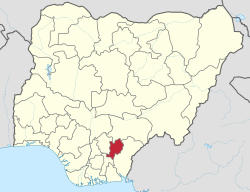INTRODUCTION
Ebonyi State is one of the five states that make up the South-East geopolitical zone of Nigeria. It has interstate boundaries with Abia State to the South, Benue State to the North, Enugu State to the West and Cross River State to the East. The state capital is Abakaliki.
LANDMASS, LOCATION, AND POPULATION
Ebonyi State covers an area of 5,532 square kilometres. It lies at latitude 6°15′ North and longitude 8°05′ East. It has a population of 2,176,947 (2006 census) 2,880,383 (2016 forecast) and a population density of 393. The state accounts for 1.6% of Nigeria's total population.
HISTORY AND PEOPLE
The early settlers of Ebonyi State were the Igbo people. The state is named after the Ebonyi (Aboine) River. Under the three-region structure of 1954, Ebonyi State was part of the Eastern Region. In 1967 with the creation of twelve federal states by General Yakubu Gowon's military government, it became a part of East-Central State. The 1976 military government of General Murtala Muhammed created nineteen states out of the existing twelve and Ebonyi State became part of Anambra State.
With the creation of Enugu and Abia States in 1991 by the military government of General Ibrahim Babangida, Ebonyi State became part of these states. In 1996, the military government of General Sanni Abacha created Ebonyi State by combining portions of Abia and Enugu States.
The Igbo people form the largest ethnic group in Ebonyi State and their language is the state’s lingua franca. A total of nine languages - Afikpo, Mgbo, Izzi, Ezaa, Ikwo, Kukele, Legbo, Mbembe and Oringare - are spoken in the state, all of which are Igbo dialects. Christianity is the major religion in Ebonyi State. About 1% of the people in the state are Muslims, while roughly 8% hold other beliefs.
MAIN TOWNS AND CITIES
Abakaliki (capital), Afikpo, Amasiri, Edda, Ishiagu, Nkalagu, Okposi, Onicha, Onueke and Uburu.
LOCAL GOVERNMENT AREAS
ADMINISTRATORS AND GOVERNORS
Walter Feghabo (Administrator - Military): October 1996 - August 1998
Simeon Oduoye (Administrator - Military): August 1998 - May 1999
Sam Egwu (Governor - Civilian (People's Democratic Party)): May 1999 - May 2007
Martin Elechi (Governor - Civilian (People's Democratic Party)): May 2007 - May 2015
Dave Umahi (Governor - Civilian (People's Democratic Party/All Progressives Congress)): May 2015 – Present
ECONOMY AND EDUCATION
Oil palm
Ebonyi State is predominantly forest savannah. Agriculture and fishing are important in the state. An estimated eighty-five percent of the population earns its living from one form of agricultural activity or another. Ebonyi's agricultural productivity is one of the highest in Nigeria. The main cash crops in the state are rice, oil palm, yam, sugar cane, cocoa and groundnut. Important minerals found in the state include lead, marble, zinc and limestone.
The state is called "the salt of the nation" because of the huge salt deposits at the Okposi and Uburu salt lakes. Nkalagu, where a major limestone formation is located, is also home to the Nigerian Cement Company. There are also quarries and rice mills.
The tertiary institutions in the state are Federal University, Ndufu-Alike Ikwo; Akanu Ibiam Federal Polytechnic, Unwana; Ebonyi State University, Abakaliki; Federal College of Agriculture, Ishiagu; and State College of Education, lkwo.
FAMOUS SITES AND CULTURE
Sites
Mmahi Ezi Salt Lake, Okposi Okwu
The Mmahi Ezi Salt Lake was discovered about 400 years by hunters in search of water.
The women process the salt using instructions said to have been issued by the goddess Mmahi. It has served as the economic base for most of the women in rural communities. It was an important supply of salt during the Nigerian-Biafran war.
Amanchor Cave, Amanchor
The Amanchor cave is one of the longest caves in Africa, It is about 4 kilometres long and 3 metres high.
The cave has several tunnels that lead to different towns making it accessible from Afikpo, Abakaliki, Ngusu and Akaeze.
Some cultural activities, including the Orie-Ogba festival take place in the cave.
Greater Rice Husks, Abakaliki
The Greater Rice Husks look like sand dunes in the desert when piled into heaps during the processing of rice.
Culture
The two major festivals in Ebonyi are the New Yam festival and the Dance Parade by Masquerades. The new yam festival is associated with the yam planting cycle. It marks the end of the planting season and heralds the harvest and consumption of new yam across communities in the state.
Masquerades have particular importance in the traditions of the state and its festival features vary across different communities.
NOTABLE INDIGENES
Akanu Ibiam (1906 – 1995)
Ofia Nwali (1942 -2016)
DID YOU KNOW
The first African to become a judge in New Jersey, the United States, Dr. Jude Obasi Nkama, is from Ebonyi State.
EBONYI STATE IN PICTURES

